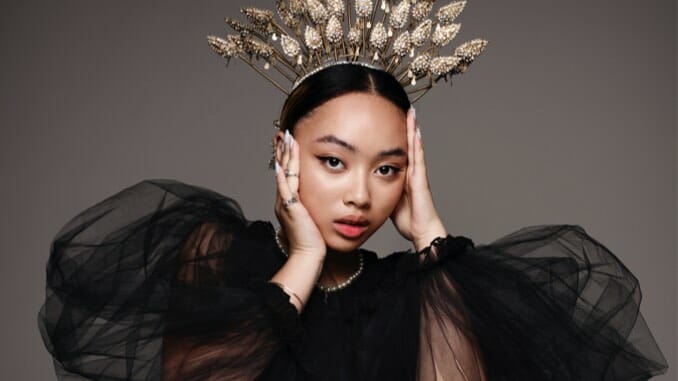Griff on Falling, Getting Back up and Putting One Foot in Front of the Other
Photo by Jordan Rossi
“To be left alone is the most precious thing one can ask of the modern world,” Anthony Burgess once observed. And it’s wisdom to which 20-year-old lone-wolf artist Griff can totally relate. Growing up in virtual cultural isolation in England’s bucolic hamlet of Kings Langley in Hertfordshire, sans local nightclubs or jumping music scenes for reference points, she developed her own unique sound and aesthetic, as well as the dogmatic self-belief to pull it all off. That confidence crackles like lightning through the video for her recent overseas hit single “One Foot in Front of the Other” (from her mixtape of the same name), wherein—sporting waist-length pigtails and frilly home-made dresses that wouldn’t look out of place on Johanna Spyri’s Tyrollean Heidi heroine—she moans like a seasoned R&B vet through a synth-rubbery, ’80s-playful soundscape. Born in seclusion, Sarah Faith Griffiths’ Griff persona/alias is truly like nothing else on the charts today. And this is only her second official release.
As the the exotic-featured daughter of a Jamaican gospel musician father and a Chinese mother who was also a singer, Griff remembers always feeling out of place, not sure of which heritage to claim, and thereby unconcerned with the latest fashionable fads. “I don’t think I constantly thought about looking cool—I think it was more like I just enjoyed creating things,” she admits. “Growing up in a very middle-class, tiny, white village, where there’s not much to do—and also when you grow up with resourceful working-class parents, and you see how resourceful they can be—I think that passes itself down, in a way. And it’s manifested in me, just making my own beats and making clothes in my room.”
The artist’s first lesson in self-reliance came from her mom, a hard-working immigrant who once worked the rice fields in Vietnam as a child. At U.K. supermarket chains like Sainsbury’s, she explains, a strange phenomenon would occur nightly around 9 p.m.—a pricing-gun-armed employee would walk through store aisles, discounting sell-by-date-nearing foods with yellow discount stickers; You either knew about the late-night deals or you didn’t. “I don’t know if they have that in America, but the guy would put a 10-pence sticker on food just to get rid of it,” she says. “So my mom would just hover by that guy, and then put it in our freezer so it didn’t go bad, and that would be the food we had for the week, like ham and broccoli or sometimes loads of scones.” She chuckles at the fond memory. “My mom was very resourceful in saving money and being creative with what we had.”
From dad, young Griffiths acquired her love of music. And even though his parents had emigrated to Britain from Jamaica as part of the Windrush Generation—which began in 1948 when thousands of Caribbean workers arrived in England to fill post-war labor shortages, and ended with 1971’s strict Immigration Act—he never introduced her to any ska, reggae or rocksteady, she swears. “My father was actually born here in South London, so he’s very Western and British,” she says. “So he would always play me soul, like Stevie Wonder and Mary J. Blige, Kirk Franklin and Bill Withers, and Whitney, of course, as well. And he sang in church now and again, and he’d do private functions and weddings, and just do bad covers and stuff. But he’s actually a really talented singer, so I guess that’s where my love of music comes from.”
At eight, after singing at a Christmas church service, the daughter caught the performance bug, too. By 11, she’d started writing, recording and producing original music on her brother’s laptop, after teaching herself the techniques through YouTube tutorials. Her folks allowed her to commandeer a spare room, where she gradually assembled the home studio where she continues to piece her complicated tracks together (she was happy to still be living said isolated life once the pandemic hit, although she hopes to move out on her own to London soon). Today, it includes several acoustic guitars, a mini-synth and a trusty Yamaha piano she was given at age 10, all of which went into her sleek, prodigious 2019 debut EP The Mirror Talk on Warner Bros.
-

-

-

-

-

-

-

-

-

-

-

-

-

-

-

-

-

-

-

-

-

-

-

-

-

-

-

-

-

-

-

-

-

-

-

-

-

-

-

-








































